We would meet at the Post Office in Ferns on Tuesday mornings. We would be handed our letter as soon as it opened at nine o'clock.
We only had a few minutes because the bus to Dublin left half an hour later. We had that time to read the motion for our next Macra debate, to try to understand the key issues we needed to research, drawing up a quick list of reading material that we should try to find.
Then one of us would hop on the the bus - it was rarely Anne; she is a teacher, so unless was it mid-term or holidays, she had to be at work. It was usually Edward, Joseph or me.
We would head for the public libraries and the libraries of Dublin’s colleges. I'm not going to say how I used to gain access to the libraries in UCD or Trinity College, but it wasn't because I had been to college. Joseph, Edward and I were all farmers, and Macra was our university.
Preparation
We had 10 days to prepare for each debate, with the motion arriving by post on the Tuesday and the debate on the following Saturday week.
There was no Google, while Wikipedia was over a decade away. The internet barely existed in the late 1980s anyway, so any information we wanted to receive about the issues we were debating had to come from books.
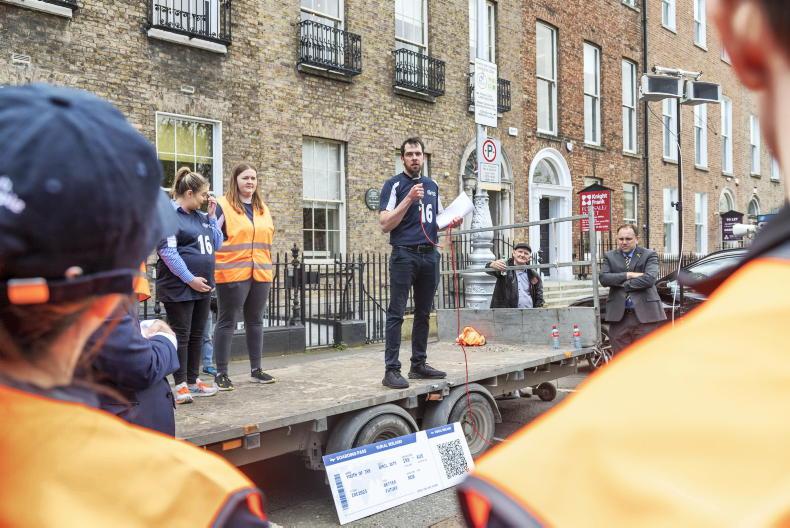
Macra president John Keane outside Agriculture House addressing the Macra marchers this week. \ Claire Nash
And the issues weren’t that different - food production, the environment, global social injustice, political instability, the increasing global population.
For our all-Ireland quarter final in 1991, we had to debate that 'Future generations will pay for our overuse of the world’s scarce resources'. Quite a mouthful there.
If the subject was related to farming issues, that meant traipsing across the city to the Irish Farm Centre
So, our nominated researcher would rent books, photocopy relevant passages from others and try to find people expert in the field under debate, either in colleges or locally.
Sometimes, if the subject was related to farming issues, that meant traipsing across the city to the Irish Farm Centre.
Con Lucey, the recently deceased former Irish Farmers' Association chief economist, was particularly helpful and insightful.
Then, as now, we debated about the future of the Common Agricultural Policy, and whether young farmers were being helped or stymied by dairy quotas - then relatively new - and what the Government could or should do to encourage generational renewal.
Wide scope
This was our education within Macra and that was just debating. There also was public speaking, there was the individual communicator competition. There was drama, there was music, there was fashion (not for me).
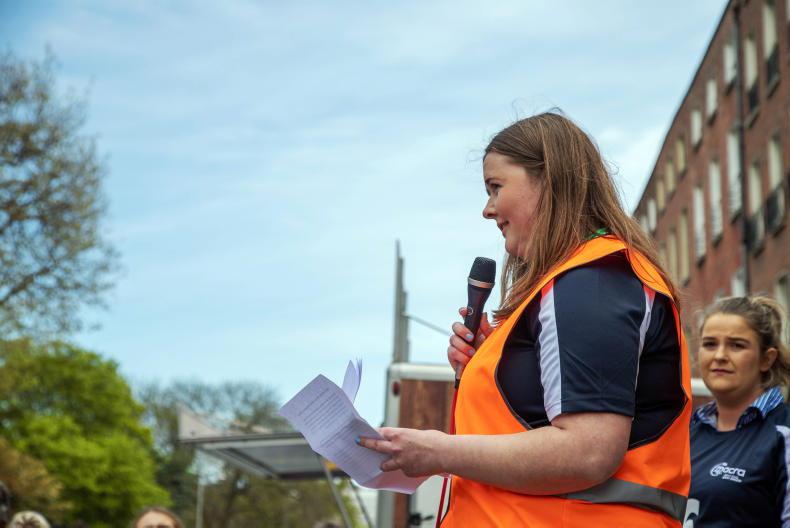
Macra president-elect Elaine Houlihan addressing the Macra marchers outside the Dail this week. \ Claire Nash
There was welding, stockjudging and farm tasks. There was fencing, stakes and wire, not Epeé or Sabre. There was quizzing - general knowledge, not know your agriculture.
In the 1970s and 1980s Cross Country Quiz was RTE’s answer to Mastermind, with Peter Murphy or Liam Devally firing questions at county teams of Macra members.
“Fingers on the buzzer” became a catchphrase from that programme; a teacher in our school gained a nickname for life having appeared on it.
I owe so much to Macra that I wouldn't be writing this column if it wasn't for it
So when I say Macra means a lot to me; that's actually an understatement. I owe so much to Macra that I wouldn't be writing this column if it wasn't for it, that's for certain.
I was just one of thousands who had their potential unlocked by an organisation founded for that very reason in 1944, when most people in rural Ireland barely got past primary school.
I’m thrilled that Macra achieved so much publicity for its actions this week. I'm thrilled for a whole number of reasons.
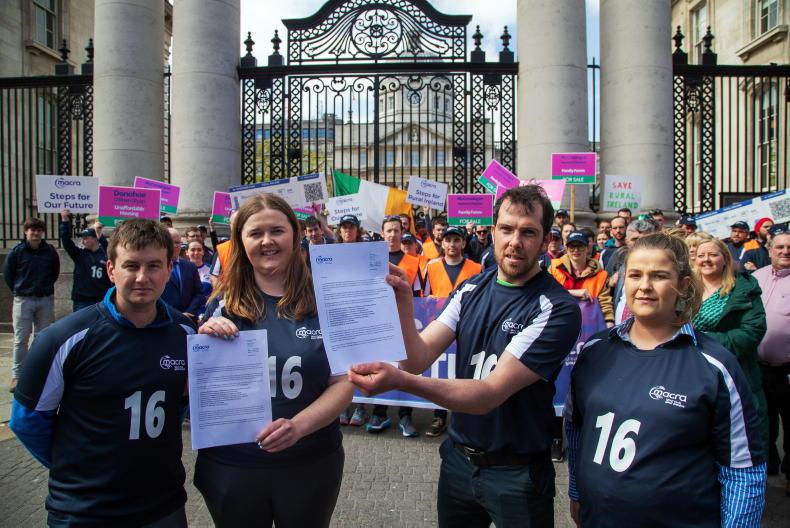
Macra members arrive at the Department of the Taoiseach following a gruelling 79km walk from Athy in Co Kildare. \ Claire Nash
Firstly, the issues it raised were real and resonated with urban and rural people alike. Secondly, the campaign was imaginative and clever, befitting a youth organisation; a 79km walk where every kilometre walked represented one of the 79 years of Macra’s history.
The journey started in Athy, as did Macra’s journey. Macra’s members marched to the gates of the Dail, capturing news headlines and wall-to-wall TV and radio coverage along the way.
And then the leadership of Macra was invited into the Dail, where they had talks with the Taoiseach.
Pressing need for youth
The main reason for Macra's march was to stress the need for improved access into farming for young people. There is a demographic timebomb at the heart of Irish farming, and it is timed for sooner than many would care to admit.
That there is only one farmer under 35 for every 15 farmers over that age threshold is shocking. And the proportion of older farmers keeps growing.
Thirty-plus years ago, when I was consumed with debating, one in five Irish farmers was over 65. Now, it's one in three. There are more farmers over 70 than under 30.
And we never needed youth and vigour in farming more. Farming has never needed to change so much and so fast before.
If all the challenges facing the sector are to be met, we need to give young farmers control where possible. They have the energy, the skill-set, the education and the drive to produce food from a shrinking land-base and with reduced inputs, while maintaining output.
We are hardly planning to feed Edenderry power plant with woodchip imported from Brazil in the long term, are we?
Not only that, but the footprint of that food production must be lighter, in terms of its impact on biodiversity, on water, air and soil quality, and in terms of the carbon footprint of food production.
Land will have to be set aside for rewetting, for forestry, for bioenergy andbiomass. We are hardly planning to feed Edenderry power plant with woodchip imported from Brazil in the long term, are we?
Defining challenges
It's one of the defining challenges of our time, maintaining food production in the face of all these sustainability challenges. It requires youth and optimism.
If I am still alive in 2050, when we are meant to have achieved carbon neutrality in our land use, I will be 84. I am not the solution and most of you reading this aren't either.
It will be down to outgoing Macra president John Keane, his successor Elaine Houlihan and their friends and contemporaries.
I salute their efforts this week. I commend Macra's CEO Michael Curran; this is the first signal achievement of his tenure.
Macra suffered severely during the COVID-19 lockdowns, with its programme of events ruined for two years.
It has been rebuilding slowly and the need for a rural youth organisation was never more clearly demonstrated than this week. Not just for farming - for housing, for transport, for education, for regional investment.
It was a good week for Macra and it bodes well for all our futures.
We would meet at the Post Office in Ferns on Tuesday mornings. We would be handed our letter as soon as it opened at nine o'clock.
We only had a few minutes because the bus to Dublin left half an hour later. We had that time to read the motion for our next Macra debate, to try to understand the key issues we needed to research, drawing up a quick list of reading material that we should try to find.
Then one of us would hop on the the bus - it was rarely Anne; she is a teacher, so unless was it mid-term or holidays, she had to be at work. It was usually Edward, Joseph or me.
We would head for the public libraries and the libraries of Dublin’s colleges. I'm not going to say how I used to gain access to the libraries in UCD or Trinity College, but it wasn't because I had been to college. Joseph, Edward and I were all farmers, and Macra was our university.
Preparation
We had 10 days to prepare for each debate, with the motion arriving by post on the Tuesday and the debate on the following Saturday week.
There was no Google, while Wikipedia was over a decade away. The internet barely existed in the late 1980s anyway, so any information we wanted to receive about the issues we were debating had to come from books.

Macra president John Keane outside Agriculture House addressing the Macra marchers this week. \ Claire Nash
And the issues weren’t that different - food production, the environment, global social injustice, political instability, the increasing global population.
For our all-Ireland quarter final in 1991, we had to debate that 'Future generations will pay for our overuse of the world’s scarce resources'. Quite a mouthful there.
If the subject was related to farming issues, that meant traipsing across the city to the Irish Farm Centre
So, our nominated researcher would rent books, photocopy relevant passages from others and try to find people expert in the field under debate, either in colleges or locally.
Sometimes, if the subject was related to farming issues, that meant traipsing across the city to the Irish Farm Centre.
Con Lucey, the recently deceased former Irish Farmers' Association chief economist, was particularly helpful and insightful.
Then, as now, we debated about the future of the Common Agricultural Policy, and whether young farmers were being helped or stymied by dairy quotas - then relatively new - and what the Government could or should do to encourage generational renewal.
Wide scope
This was our education within Macra and that was just debating. There also was public speaking, there was the individual communicator competition. There was drama, there was music, there was fashion (not for me).

Macra president-elect Elaine Houlihan addressing the Macra marchers outside the Dail this week. \ Claire Nash
There was welding, stockjudging and farm tasks. There was fencing, stakes and wire, not Epeé or Sabre. There was quizzing - general knowledge, not know your agriculture.
In the 1970s and 1980s Cross Country Quiz was RTE’s answer to Mastermind, with Peter Murphy or Liam Devally firing questions at county teams of Macra members.
“Fingers on the buzzer” became a catchphrase from that programme; a teacher in our school gained a nickname for life having appeared on it.
I owe so much to Macra that I wouldn't be writing this column if it wasn't for it
So when I say Macra means a lot to me; that's actually an understatement. I owe so much to Macra that I wouldn't be writing this column if it wasn't for it, that's for certain.
I was just one of thousands who had their potential unlocked by an organisation founded for that very reason in 1944, when most people in rural Ireland barely got past primary school.
I’m thrilled that Macra achieved so much publicity for its actions this week. I'm thrilled for a whole number of reasons.

Macra members arrive at the Department of the Taoiseach following a gruelling 79km walk from Athy in Co Kildare. \ Claire Nash
Firstly, the issues it raised were real and resonated with urban and rural people alike. Secondly, the campaign was imaginative and clever, befitting a youth organisation; a 79km walk where every kilometre walked represented one of the 79 years of Macra’s history.
The journey started in Athy, as did Macra’s journey. Macra’s members marched to the gates of the Dail, capturing news headlines and wall-to-wall TV and radio coverage along the way.
And then the leadership of Macra was invited into the Dail, where they had talks with the Taoiseach.
Pressing need for youth
The main reason for Macra's march was to stress the need for improved access into farming for young people. There is a demographic timebomb at the heart of Irish farming, and it is timed for sooner than many would care to admit.
That there is only one farmer under 35 for every 15 farmers over that age threshold is shocking. And the proportion of older farmers keeps growing.
Thirty-plus years ago, when I was consumed with debating, one in five Irish farmers was over 65. Now, it's one in three. There are more farmers over 70 than under 30.
And we never needed youth and vigour in farming more. Farming has never needed to change so much and so fast before.
If all the challenges facing the sector are to be met, we need to give young farmers control where possible. They have the energy, the skill-set, the education and the drive to produce food from a shrinking land-base and with reduced inputs, while maintaining output.
We are hardly planning to feed Edenderry power plant with woodchip imported from Brazil in the long term, are we?
Not only that, but the footprint of that food production must be lighter, in terms of its impact on biodiversity, on water, air and soil quality, and in terms of the carbon footprint of food production.
Land will have to be set aside for rewetting, for forestry, for bioenergy andbiomass. We are hardly planning to feed Edenderry power plant with woodchip imported from Brazil in the long term, are we?
Defining challenges
It's one of the defining challenges of our time, maintaining food production in the face of all these sustainability challenges. It requires youth and optimism.
If I am still alive in 2050, when we are meant to have achieved carbon neutrality in our land use, I will be 84. I am not the solution and most of you reading this aren't either.
It will be down to outgoing Macra president John Keane, his successor Elaine Houlihan and their friends and contemporaries.
I salute their efforts this week. I commend Macra's CEO Michael Curran; this is the first signal achievement of his tenure.
Macra suffered severely during the COVID-19 lockdowns, with its programme of events ruined for two years.
It has been rebuilding slowly and the need for a rural youth organisation was never more clearly demonstrated than this week. Not just for farming - for housing, for transport, for education, for regional investment.
It was a good week for Macra and it bodes well for all our futures.







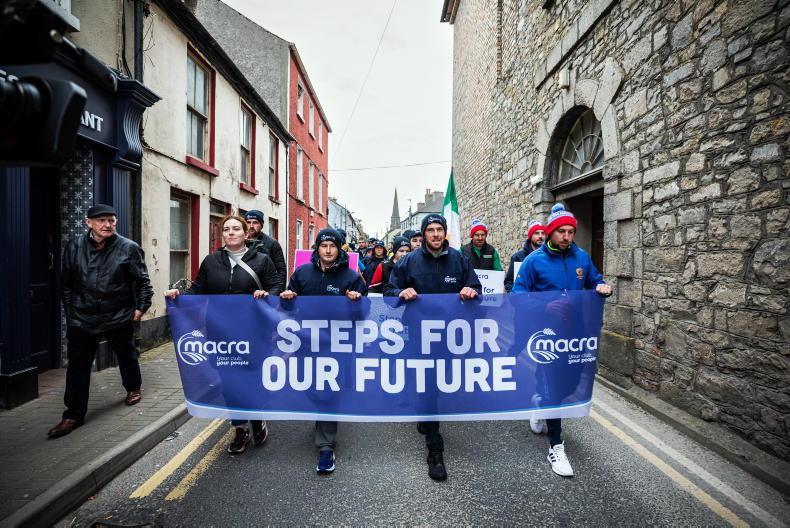
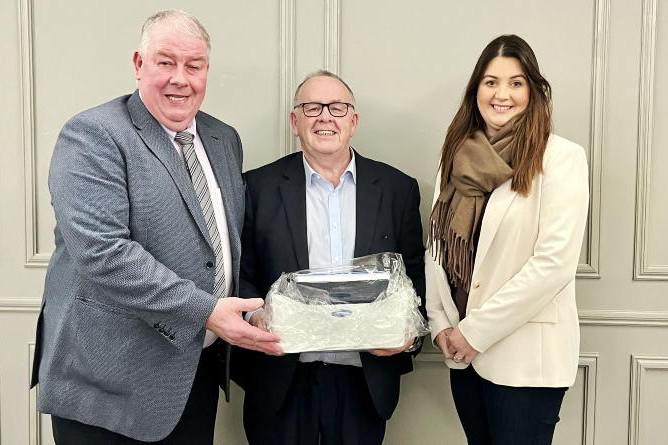
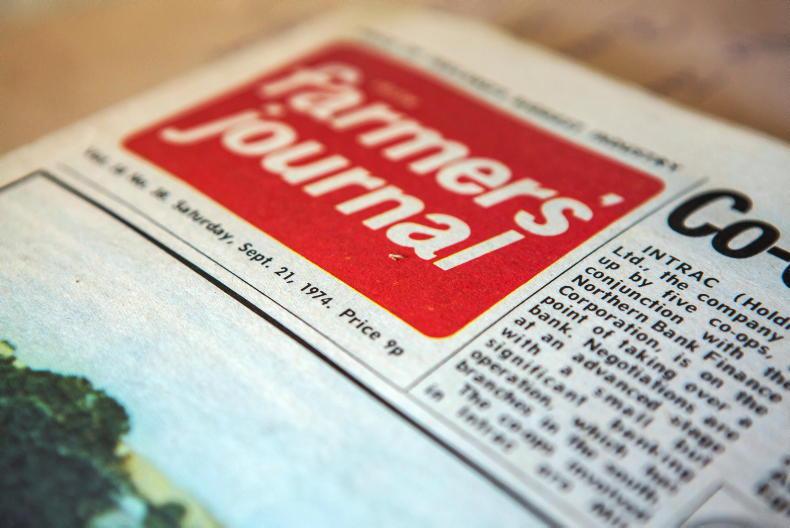
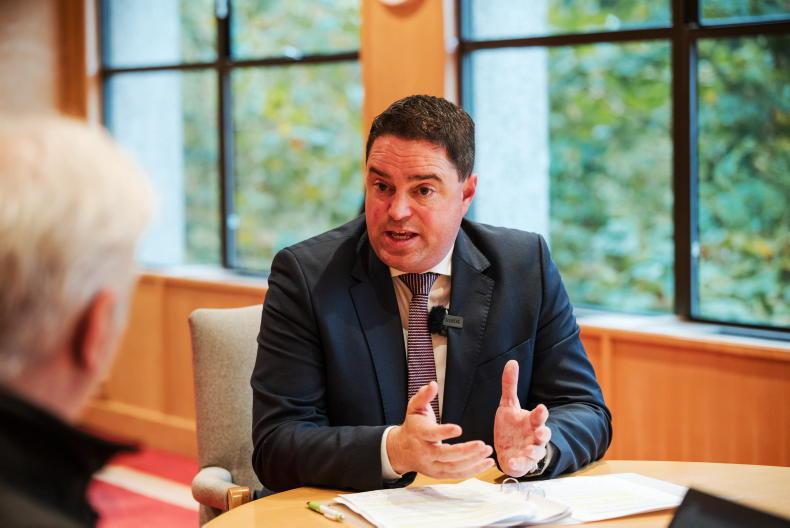
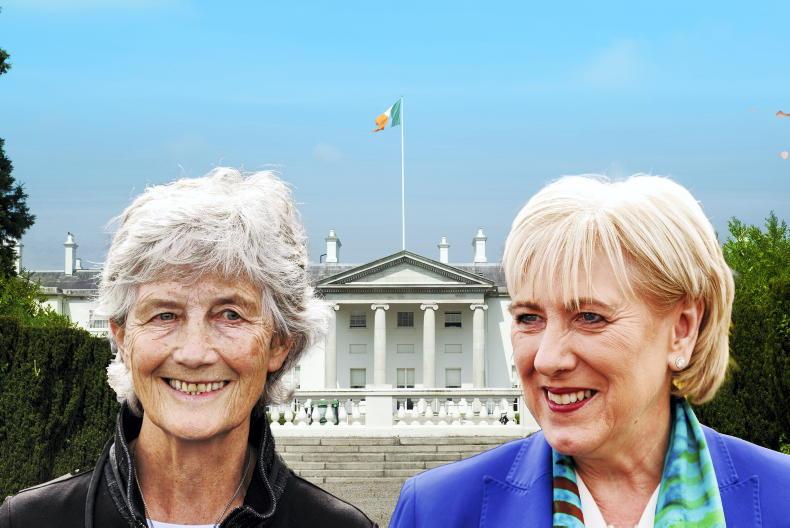
SHARING OPTIONS